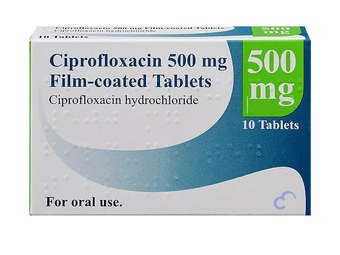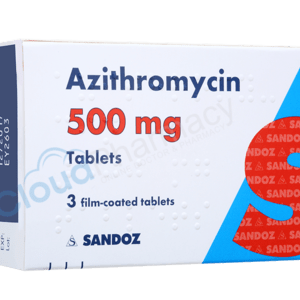Traveller's Diarrhoea

More information
Introduction
Traveller’s diarrhoea is a common gastrointestinal infection that causes symptoms such as loose stools and stomach cramps. As many as over 20% of travellers get diarrhoea, depending on their destination and the time of year. For this reason, you may wish to stock up on treatment before travelling. Foreign holidays can be fun, but if you contract traveller’s diarrhoea, you could face unpleasant symptoms for three days or more.
This page provides information on the symptoms and causes of traveller’s diarrhoea, as well as various treatments and ways to prevent the condition.
If you’re going abroad and want to be prepared in case you get traveller's diarrhoea, you can order an effective antibiotic treatment online from Cloud Pharmacy to take with you.
Complete a consultation about your health and our online clinic will provide appropriate treatment.
The antibiotic you need depends on where you are travelling.
Treatments
More information
Once an online consultation has been been approved by our medical team, our pharmacy will safely prepare and ship your treatment to you in discreet packaging using Royal Mail or DPD.
What Is Traveller’s Diarrhoea?
Traveller’s diarrhoea is when you have loose or watery bowel movements. It is the most common illness experienced by foreign travellers and is usually caused by a bacterial infection. Typically, traveller’s diarrhoea isn’t serious and will pass in a few days.
The bacteria, virus or parasite that causes traveller’s diarrhoea results in loose stools and sometimes stomach cramps. It is the inflammatory response of the immune system to the infection. While traveller’s diarrhoea isn’t usually a serious condition, you may become dehydrated, especially in hot countries. Prolonged dehydration can lead to numerous health problems, including urinary tract infections, kidney failure, seizures and swelling of the brain. Luckily, there is a range of treatments and preventatives to stop you from contracting traveller’s diarrhoea.
What Causes Traveller’s Diarrhoea?
You may get traveller’s diarrhoea when consuming drinks or food that is contaminated with an infectious agent. These infectious agents may be:
- Bacteria, including campylobacter jejuni, cholera, salmonella and shigella
- Viruses, such as astrovirus, norovirus and rotavirus
- Parasite infections such as cyclospora, cryptosporidium, and giardia
While traveller’s diarrhoea is usually due to infectious agents, it can also be caused by the stress of travelling or a change in diet. Natives are usually unaffected by the infectious agents that cause diarrhoea in travellers because their bodies are accustomed to them.
Traveller’s Diarrhoea Symptoms
The signs and symptoms of traveller’s diarrhoea can include:
- Loose, watery stools – starting abruptly and occurring three or more times a day
- Needing the toilet urgently
- Stomach pain or cramping
- Nausea
- Fever
- Vomiting
If you are not careful, diarrhoea may lead to dehydration, which presents its own potential health risks. Electrolyte imbalance from dehydration can adversely affect bodily functions due to low magnesium, potassium and sodium levels, while kidney failure could be the result of insufficient fluids being supplied to the kidneys. For more information, please read our guide to vitamins and supplements.
You should seek medical help if you have:
- Had diarrhoea for more than two days
- Had more than six loose stools within 24 hours
- A fever and a temperature of over 102°
- Severe stomach pain
- Severe pain in your rectum
- Been vomiting frequently
- Bloody stools
- Black stools
- Symptoms of dehydration
Babies and children with diarrhoea can display the same symptoms as adults, but typically become dehydrated more quickly. Children are more susceptible to diarrhoea caused by viruses than adults.
How Long Does Traveller’s Diarrhoea Last?
Usually, symptoms of traveller’s diarrhoea will begin to improve within two to three days, without treatment. If your infection is bacterial, it might take up to a week for symptoms to clear. Diarrhoea that is caused by a parasite can last for longer if left untreated.
Using traveller's diarrhoea treatment – such as antibiotics and anti-motility medication - can help speed up the process and make the symptoms more bearable, allowing you to go about your daily activities.
Is Traveller’s Diarrhoea Contagious?
Traveller’s diarrhoea itself is not contagious. But the infection which caused it – such as food poisoning – could be. It’s important to wash your hands regularly if you or a companion have diarrhoea. Infections can spread through germs which are present in food or on surfaces. Ingesting these germs – either when eating or touching infected surfaces before touching your mouth – allows them to spread.
Risk Factors of Traveller’s Diarrhoea
Some destinations present a higher risk than others for traveller’s diarrhoea. High-risk regions include:
- South Asia
- South East Asia
- Africa
- Central America
- South America
Regions which pose some risk include:
- East Asia
- Central Asia
- The Middle East
- South Africa
- Eastern Europe
Low-risk areas for traveller’s diarrhoea include:
- Australia
- New Zealand
- Japan
- Singapore
- Northern Europe
- Western Europe
- The United States
- Canada
While destinations are a factor in your chances of contracting traveller’s diarrhoea, there are other risk factors involved. You may be at a greater risk of getting traveller’s diarrhoea if you:
- Have a weak immune system
- Are young, as younger people may have less acquired immunity than older adults and can be more adventurous with their food choices
- Are taking antacids or acid blockers, as lower levels of stomach acid may allow bacteria to survive
- Have a condition which makes you more vulnerable to infections, such as heart, liver or kidney disease, or diabetes
- If you travel at certain times of the year, e.g. the summer months
Traveller’s Diarrhoea Treatment
Traveller’s diarrhoea will most likely get better without treatment, but it's important to try and stay hydrated with safe liquids like bottled water or oral rehydration solutions. If you can’t find bottled rehydration solutions or oral rehydration salts powder, you may wish to mix your own rehydration solution, using salt, sugar and uncontaminated water. However, if that doesn’t work, there is a range of treatments available to help combat symptoms and treat the infection.
Antibiotics for diarrhoea – such as ciprofloxacin, azithromycin and levofloxacin – may be prescribed, especially if you have severe symptoms. You can purchase effective antibiotics like ciprofloxacin and azithromycin through our online pharmacy, once you have completed an online consultation. Once approved, your medication will be shipped directly to your door in a discreet package the following day. Please note that you should never use an antibiotic as a way to prevent diarrhoea, as you will build up resistance to it.
Anti-motility agents – including loperamide, codeine phosphate and co-phenotrope – can provide temporary relief for diarrhoea by reducing muscle spasms in the gastrointestinal tract. Bismuth subsalicylate is an over-the-counter medication that can reduce the frequency of stools by decreasing fluid flow into the bowels.
How to Prevent Traveller’s Diarrhoea
The saying ‘prevention is better than the cure’ certainly applies to traveller’s diarrhoea. There are a number of measures you can take to avoid diarrhoea when travelling to a foreign country. Here are some recommendations:
- Drink bottled water: it is important to avoid unsterilised tap water. If you must drink the local water, boil it for at least three minutes before allowing it to cool.
- Wash your hands regularly: washing your hands frequently with soap and clean water is fundamental to good hygiene, especially before eating or drinking.
- Prepare food hygienically: if you are cooking, wash your hands before, during and after food preparation. Prepare food in a clean, sanitised area. Don’t cook for others if you have diarrhoea. Ensure your food is cooked properly.
- Use sanitiser: if you aren’t able to wash your hands, hand sanitiser is an effective alternative.
- Don’t ingest water while you are swimming in pools or in the sea
- Choose food carefully: avoid street vendors, who may use contaminated water to cook food
Guides
How it works
First...
Complete a quick eligibility check
Then...
Order your treatment
Finally.
Fast, confidential delivery to your door





















